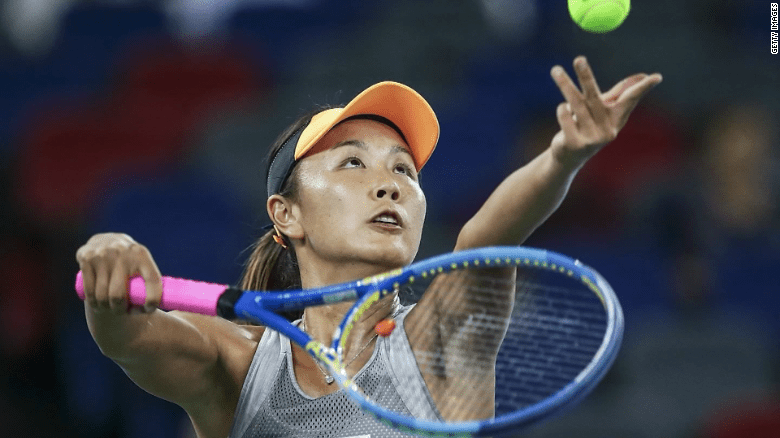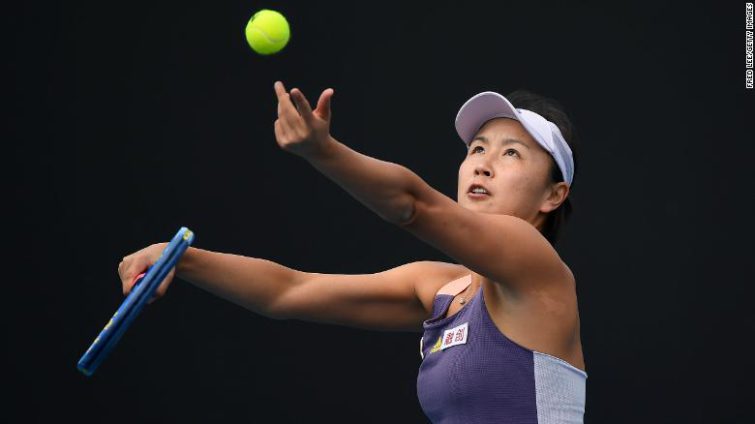When tennis star Peng Shuai launched her explosive #MeToo accusation against a former Communist Party leader earlier this month, the Chinese government responded in typical fashion -- by muffling her with blanket censorship.
Now, more than two weeks on, Beijing is facing a storm of its own making, as the global women's tennis community rises up to challenge Chinese authorities for silencing one of their peers.
Peng, 35, a two-time former Grand Slam doubles champion, has vanished from the public eye since she accused former Vice Premier Zhang Gaoli, 75, of coercing her into sex at his home in a since-deleted social media post on November 2. Since then, Chinese censors have been diligently scrubbing her name and even the vaguest references to her allegations from the internet.
But the silencing campaign has failed to work outside of China. Over the past few days, the Women's Tennis Association (WTA) and some of its biggest stars, past and present, have spoken out in solidarity with Peng, demanding to know her whereabouts.
Concerns have only grown after Chinese state media released a screenshot of an email, purportedly from Peng and sent to the WTA, walking back her sexual allegations and claiming "everything is fine."
In an interview with CNN, WTA chief Steve Simon described the email as a "staged statement of some type." He also declared the association is "at a crossroads" with China, threatening to pull business out of the country if Peng's safety is not guaranteed and her allegations not properly investigated.
And the reverberations don't just end in women's tennis -- already, male tennis players have joined the Twitter campaign titled #WhereIsPengShuai, as have football stars.
With the Winter Olympics less than three months away, analysts say the controversy, if unresolved, could snowball into an unprecedented showdown between the wider sports community and Beijing.
"Sports fans around the world will be paying attention to this story, which includes billions of people," said William Nee, a research and advocacy coordinator at NGO Chinese Human Rights Defenders (CHRD).
"This is an absolutely looming disaster for the Chinese government. Every day that gets closer to the Winter Olympics, the disaster gets bigger and bigger for them -- if they don't resolve this."
The Beijing Olympics, scheduled for February, is already facing growing calls for a boycott over the Chinese government's crackdown on Xinjiang, Tibet and Hong Kong. And the global outcry over the disappearance of Peng -- who has played in three Olympics -- can amplify those calls, Nee said.
The International Olympic Committee (IOC), meanwhile, said it would not comment on the matter and suggested "quiet diplomacy" should be approached, Reuters reported. CNN has reached out to the IOC for comment.
Direct challenge
That a since-censored social media post could rally the tennis world to stand up to Beijing would likely have come as a surprise for the Chinese government. In recent years, authorities in Beijing have successfully silenced not only countless domestic voices, but also a growing list of Western companies and industries hoping to maintain access to the lucrative Chinese market -- from Hollywood to the NBA.
But the WTA has refused to play along.
"There (are) too many times in our world today when we get into issues like this, we let business, politics, money dictate what's right and what's wrong," Simon, the WTA chief, said in his CNN interview Thursday.
"We have to start as a world making decisions that are based upon right and wrong, period, and we can't compromise that," he said.
"We're definitely willing to pull our business and deal with all the complications that come with it. Because this is certainly, this is bigger than the business."By preparing to turn its back on access to the Chinese market, including a 10-year deal to hold its annual finals in the southern Chinese city of Shenzhen, the WTA is posing a direct challenge to Beijing.
Beijing routinely uses market access as powerful leverage to force Western business to hush up on human rights, or to toe its lines on issues such as Taiwan and Hong Kong. But in the case of the WTA, such tactics have not worked out as planned.
"So far, from a business and human rights point of view, the WTA is doing a much better job than almost any companies that have been engaged in controversies in China. And this actually shows one way forward for how to do it," said Nee with the CHRD.Mareike Ohlberg, senior fellow at the German Marshall Fund's Asia Program, said the bold move the WTA has taken is "the right thing to do."
"It's what frankly more (organizations) should do. Most of the organizations are very scared of China, (fearing) China can punish them. I do think it's important that more organizations realize they also have a certain leverage," she said.
The nature of Peng's allegations has also set her case apart from previous political controversies involving China's crackdowns in Xinjiang, Tibet and Hong Kong. In those cases, an incensed Beijing lashed out at Western companies for meddling in "China's internal affairs."
But the women's rights movement knows no national boundaries. To date, the Chinese government has moved to suppress #MeToo advocacy. It has harnessed its authoritarian apparatus to detain, imprison, threaten and silence Chinese feminists and their supporters. And it has mobilized its propaganda machine to portray feminism as a stooge of Western influence designed to undermine China.
But now, such tactics may prove counterproductive, as the global #MeToo movement helps to bring attention to Peng's case, Ohlberg said."It's a transnational movement that has ties abroad, and therefore you can't just confine it to a single country, and you can't just make people shut up in China," she said.
"And that's why it's so important that people keep speaking out about these things internationally. Because if you're based in China, the state has so many options to shut you up," she said. "(The International community) has a certain responsibility to show solidarity."
Beijing's dilemma
By silencing Peng, Beijing is facing an unusual dilemma. If Peng were to appear on state television, analysts say many will take what she says with a grain of salt, given Chinese state media's long track record of airing forced confessions or other statements made under duress from people in extrajudicial detention.
And while in Western democracies, it would be easy for the ruling party to deny such accusations, or even distance itself from a senior official, in China, party leaders are beyond reproach from members of the general public.
And Zhang is no ordinary leader. He once served on the Communist Party's seven-member Polituro Standing Committee, the country's supreme leadership body, alongside Chinese President Xi Jinping.

The only way for senior leaders to fall from grace is to be disciplined by the party itself -- as some have in Xi's sweeping anti-corruption campaign.
To date, the Chinese government has repeatedly refused to comment on Peng's case. Speaking at a news conference Thursday, Chinese Foreign Ministry spokesperson Zhao Lijian said Peng's accusation is not a diplomatic issue and declined to comment further. CNN has reached out to China's State Council Information Office for comment.
The political sensitivity is perhaps best demonstrated in a tweet by Hu Xijin, editor-in-chief of state-run nationalist tabloid the Global Times.
Hu is the only high-profile state media propagandist who has commented on Peng's case in public -- albeit on a platform banned in China."
As a person who is familiar with Chinese system, I don't believe Peng Shuai has received retaliation and repression speculated by foreign media for the thing people talked about," he wrote in the early hours of Thursday -- seemingly too afraid to even mention the name of the accused, or the nature of the allegation.
Latest Stories
-
Ghana and India to expand cooperation in trade, agriculture, energy – Mahama
2 hours -
Your visit reaffirms our collective commitment to global peace, prosperity – Mahama tells Narendra Modi
2 hours -
Israel: A divine and historical claim rooted in scripture and truth
2 hours -
Norway fight back to beat Euro 2025 host Switzerland
2 hours -
Anabel Rose unveiled as Fresh Finds Spotify cover for June
2 hours -
Stalled Winneba-Kasoa highway sparks concerns over unpaid contractor arrears
2 hours -
Sean ‘Diddy’ Combs loses bid for release on bail ahead of sentencing
2 hours -
Court discharges lecturer, 2 students over room, bed allocation scandal
2 hours -
Friday Club urges NPP presidential hopefuls to prioritise unity and issue-based campaigning
2 hours -
Court grants bail to TikToker over viral political claims
2 hours -
Youth urges State of Emergency declaration on galamsey at PNAfrica National Youth Mock Parliament
2 hours -
Burning of waste bins and indiscriminate dumping threaten sanitation management efforts – Zoomlion
3 hours -
NPP brutally injured, recovery will take time – Addai-Nimoh
3 hours -
Rastafarian student Oheneba Nkrabea graduates from GIS after Achimota saga
3 hours -
Gov’t heighten monitoring along Black Volta after drowning of Lawra SHS students
3 hours

